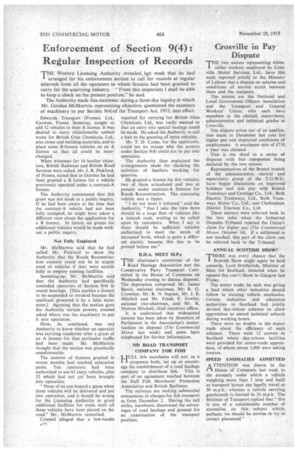Enforcement of Section 9(4): Regular Inspection of Records
Page 32

If you've noticed an error in this article please click here to report it so we can fix it.
THE Western Licensing Authority revealed.. last week that he had I arranged for his enforcement section to call for records at regular intervals from ail the operators to whom licences had been granted to carry for the quarrying industry. "From this inspection I shall be able to keep a check on the present position," he said.
The Authority made this statement during a three-day inquiry in which Mr. Gordon McMurtrie, representing objectors, questioned the existence of machinery to put Section 9(4) of the Transport Act, 1953, into effect.
Edwards Transport (Frorne), Ltd., Garston, Frome, Somerset, sought to add 12 vehicles to their A licence. It was desired to carry objectionable animal waste for British Glue Chemicals, .Ltd., also stone and building materials, and to place some 13-licence vehicles on an A licence so that all could be interchanged.
When witnesses for 14 haulier objectors, British Railways and British Road Services were called, Mr. 1. R. Pickford. of Frorne, stated that in October he had been granted a B licence for a vehicle previously operated under a contract-A licence.
The Authority commented that this grant was not made at a public inquiry. If he had been aware at the time that the contract-A vehicle had not been fully occupied, he might have taken a different view about the application for a B licence. In future, no grants for additional vehicles would be made without a public inquiry.
Not Fully Employed
Mr. McMurtrie said that he had called Mr. Pickford to show the Authority that the Roads Reconstruction concern could not be in urgent need of vehicles if they were unable fully to employ existing facilities.
Summing-up, Mr. McMurtrie said that the Authority had specifically reminded operators of Section 9(4) in recent hearings. [This enables a licence to be suspended or revoked because the applicant procured it by a false statement.] Agreeing that the section gave the Authority certain powers, counsel asked where was the machinery to put it into operation.
How, lie continued, was any Authority to know whether an operator was carrying roadstone after a grant of an A licence for that particular traffic had been made. Mr. McMurtrie thought that the section was practically unenforceable.
The number of licences granted in recent months had reached saturation point. Ten operators had been authorized to use 61 extra vehicles, plus 32 which had not yet been brought into operation.
"None of us can hazard a guess when these vehicles will be delivered and put into operation, and it Would be wrong for the Licensing Authority to grant additional facilities for stone until all these vehicles have been placed on the road," Mr. McMurtrie submitted.
Counsel alleged that a low-loader required for carrying for British Glue Chemicals, Ltd., was really wanted so that an entry into special haulage could be made. He asked the Authority to call a halt to the granting of extra vehicles.
Mr. T. D. Corpe, for the applicants, could see no reason why the powers under Section 9(4) could not be put into operation.
The Authority then explained the arrangements made for checking the activities of hauliers working for quarries.
He granted a licence for five vehicles, two of them articulated and two at present under contract-A licences for Roads Reconstruction. The remaining vehicle was a tipper.
"I do not want it inferred," said the Authority, " that I take the view there should be a large fleet of vehicles like a taxicab rank, wailing to be called upon by customers. What I say is there should be sufficient vehicles authorized to meet the needs of increased work, which is quite a different matter, because this has to be proved before me."
R.H.A. MEET M.P.s
THE chairman's committee of the Road Haulage Association met the Conservative Party Transport Committee in the House of Commons on Wednesday evening to discuss disposal. The deputation comprised Mr. James Barrie, national chairman, Mr. R. G. Crowther, Mr. R. N. Ingram, Mr. J. B. Mitchell and Mr. Frank F. Fowler, national vice-chairman, and Mr. R. Morton Mitchell, chief executive officer.
It is understood that widespread interest has been taken by Members of Parliament in the Association's memorandutn on disposal (The Commercial Motor last week) and some have telephoned for further information.
NO ROAD TRANSPORT COMPANY FOR FISH
HULL fish merchants will not, as a corporate body, set up or encourage the establishment of a road haulage company to distribute fish. This is part of an agreement reached between the Hull Fish Merchants' Protection Association and British Railways.
The railways are making substantial concessions in charges for fish transport as from December 1. During the rail strike, merchants discovered the advantages of road haulage and pressed for an examination of the transport position.




































































































